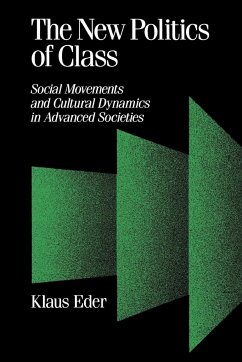Are contemporary societies organized by class? In recent years the apparent fragmentation of established class structures and the emergence of new social movements - in particular the women's movement and environmentalism - have altered the traditional expressions of class in society. At the same time, these changes have posed fundamental questions for the concept of class in sociology and political science.
In this major reassessment, Klaus Eder offers a new perspective on the status of class in modernity. Drawing on a critique of Bourdieu, Touraine and Habermas, he outlines a cultural conception of class as the basis for understanding contemporary societies. His model reevaluates the role of the middle classes, traditionally the crux of class analysis, and links class to social theories of power and cultural capital. The result is a cultural theory of class which incorporates the changing forms of collective action and the new social movements of contemporarysocieties.
In this major reassessment, Klaus Eder offers a new perspective on the status of class in modernity. Drawing on a critique of Bourdieu, Touraine and Habermas, he outlines a cultural conception of class as the basis for understanding contemporary societies. His model reevaluates the role of the middle classes, traditionally the crux of class analysis, and links class to social theories of power and cultural capital. The result is a cultural theory of class which incorporates the changing forms of collective action and the new social movements of contemporarysocieties.
`Addresses important questions and has some interesting things to say about them... [the book] is a `sampler' of the work of a social theorist who is already influential in Germany.... Eder is clearly an astute and well-informed analyst' - Theory, Culture & Society
`Eder makes a significant contribution to the development of a theory of social movements which avoids the reductive tendencies of Marxism while at the same time allowing us to perceive the new social movements as more than free floating interest groups... Eder's essays are theoretically rigorous and innovative' - Political Studies
`Provides a good occasion to get to know this important German sociologist.... Eder's theorizing is very rich, full of provocative conceptual ideas and sound insights' - American Journal of Sociology
`Eder's work is systematic, rigorous and an important statement of the NSM (New Social Movements) approach' - Choice
`Eder makes a significant contribution to the development of a theory of social movements which avoids the reductive tendencies of Marxism while at the same time allowing us to perceive the new social movements as more than free floating interest groups... Eder's essays are theoretically rigorous and innovative' - Political Studies
`Provides a good occasion to get to know this important German sociologist.... Eder's theorizing is very rich, full of provocative conceptual ideas and sound insights' - American Journal of Sociology
`Eder's work is systematic, rigorous and an important statement of the NSM (New Social Movements) approach' - Choice

